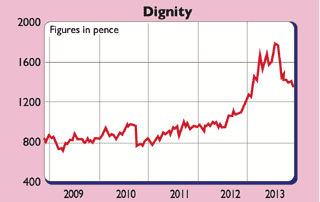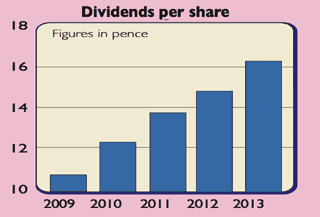Get the latest financial news, insights and expert analysis from our award-winning MoneyWeek team, to help you understand what really matters when it comes to your finances.
You are now subscribed
Your newsletter sign-up was successful
Want to add more newsletters?

Twice daily
MoneyWeek
Get the latest financial news, insights and expert analysis from our award-winning MoneyWeek team, to help you understand what really matters when it comes to your finances.

Four times a week
Look After My Bills
Sign up to our free money-saving newsletter, filled with the latest news and expert advice to help you find the best tips and deals for managing your bills. Start saving today!
Future demand is guaranteed for funeral provider Dignity, says Phil Oakley.
Dignity(LSE: DTY)is the largest independent provider of funeral services in the UK and the largest owner of crematoria. It has around a 12% share of the funeral market. The company was created in 1994 and bought by current chairman Peter Hindley and chief executive Mike McCollum in 2002 with the help of a private-equity partner.
The shares have delivered spectacular returns since the company was listed in 2004. A shareholder who invested at the flotation would have had more than their initial stake returned to them, and would still be holding a share that has more than tripled in value.However, this ability to churn out consistently good results means Dignity's shares are sought-after and are not particularly cheap. Can the shares keep delivering the goods or will future returns disappoint?
MoneyWeek
Subscribe to MoneyWeek today and get your first six magazine issues absolutely FREE

Sign up to Money Morning
Don't miss the latest investment and personal finances news, market analysis, plus money-saving tips with our free twice-daily newsletter
Don't miss the latest investment and personal finances news, market analysis, plus money-saving tips with our free twice-daily newsletter
Prospects for the business
The company makes money by selling funeral services, cremations, and from the growing trend for people to pay for their funeral in advance so-called pre-paid funeral plans. It's an extremely profitable business. Its funeral services business has profit margins of 42%, while those from cremations are even higher at over 58%.
Returns on the money invested in the business (return on capital employed, or ROCE) were a very healthy 22.6% last year. Based on its financial performance and steady growth, Dignity has the hallmarks of one of the most outstanding companies listed on the stock exchange.
Usually a company making big profits will attract the attention of competitors and see its profits forced down. That's one of the building blocks of capitalism. But although the funeral industry is competitive, Dignity's profits have not come under threat yet.
The main reason for this is that it is quite difficult for new businesses to get into this market. The primary barrier to entry' is the critical importance of having a good reputation, which is something that takes years to build. Planning restrictions also make it difficult for competitors to build new crematoria. That means that even though land prices have been quite favourable recently, there aren't many new facilities opening up.
There has also been talk of regulating the funeral services industry. You might think that would be bad for Dignity's profits, but that's by no means certain. In fact, regulation may act as yet another barrier to entry and protect it from competition. So at the moment it's hard to see the company's profits coming under serious pressure in the short term.
That's not to say that Dignity doesn't face any challenges. The death rate has been slowly falling in recent decades as people are living longer, which has altered the demand for funerals. To counter this, Dignity has been hoovering up lots of smaller businesses. The funeral services market remains very fragmented, with lots of small family businesses that are ripe for take over, which Dignity can integrate into its existing network and so boost profits.
A glance through its accounts also suggests that Dignity has the ability to raise prices to cover costs another good sign. Revenues have grown faster than overall demand for funerals and cremations, which has helped profit margins to continue to grow.
While the death rate may be falling, broad demand for funerals is still relatively easy to predict, which means Dignity's cash flows are very reliable. It also has the equivalent of four and half years of its current funeral workload pre-booked. So while investors would normally see Dignity's high levels of debt as a danger sign, the predictable nature of the business enables it to support quite a high level of debt comfortably.
Should you buy the shares?
All in all, Dignity has a lot going for it. In fact, for me the most worrying aspect is that it's hard to see what could go wrong. A disruptive competitor seems unlikely at the moment. It's possible that increased regulation of funerals or pre-paid funeral plans may knock sentiment towards the shares if it was announced, but as I already said, this could well be a benefit in the longer run.
The shares are not cheap, trading on over 18 times this year's earnings with a negligible dividend yield but they look worth every penny. The high quality of the business and the expectation of further strong earnings growth means they look a good long-term investment.
Verdict: buy


What the analysts say
Get the latest financial news, insights and expert analysis from our award-winning MoneyWeek team, to help you understand what really matters when it comes to your finances.
MoneyWeek is written by a team of experienced and award-winning journalists, plus expert columnists. As well as daily digital news and features, MoneyWeek also publishes a weekly magazine, covering investing and personal finance. From share tips, pensions, gold to practical investment tips - we provide a round-up to help you make money and keep it.
-
 Can mining stocks deliver golden gains?
Can mining stocks deliver golden gains?With gold and silver prices having outperformed the stock markets last year, mining stocks can be an effective, if volatile, means of gaining exposure
-
 8 ways the ‘sandwich generation’ can protect wealth
8 ways the ‘sandwich generation’ can protect wealthPeople squeezed between caring for ageing parents and adult children or younger grandchildren – known as the ‘sandwich generation’ – are at risk of neglecting their own financial planning. Here’s how to protect yourself and your loved ones’ wealth.

